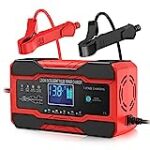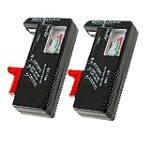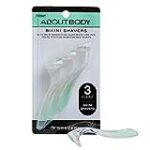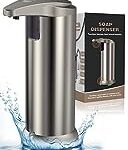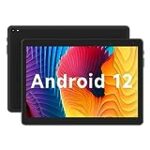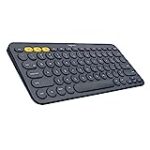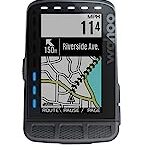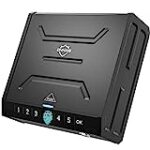🌅 Introduction
Welcome to our comprehensive guide on finding the best charge controllers for your needs. As renewable energy becomes increasingly popular, the demand for efficient and reliable charge controllers has skyrocketed. Whether you’re a seasoned solar enthusiast or a beginner just dipping your toes into the world of alternative energy, we’re here to help you navigate through the vast array of options and find the best value for your money. In this guide, we’ll explore the key features, benefits, and considerations for choosing a charge controller that suits your specific requirements. Let’s dive in and power up your solar system efficiently!
🏆 Our Top 5
- 🔋 Smart 4-Stage PWM Charging: This solar charge controller utilizes Bulk/Boost/Float/Equalization modes to extend battery life by 30% vs standard controllers. It auto-detects 12V/24V systems (non-lithium) and adjusts current pulses to prevent overcharging, making it an efficient solar panel charger for off-grid setups
- 🛡️ Comprehensive Protections & Self-Diagnosis: Featuring 6 key safeguards (Overcharge/Over-discharge/ Overload/Short-Circuit/Reverse Polarity) and LCD error codes, this charge controller offers superior safety. The Negative Ground design resists interference, ensuring reliability as a top-tier solar chargers solution
- 📡 Dual Monitoring & USB Charging: With a backlit LCD for real-time data and an RS232 port for Renogy DC Home App control, this renogy charge controller includes a built-in 5V/2A USB port. It acts as a versatile solar charger 12v for instant phone/tablet charging
- 🔌 Ultra-Low Power Efficiency: Boasting <10mA self-consumption, this solar charge controller 12v maximizes battery efficiency in off-grid systems (e.g., cabins/RVs). Its compact size fits tight spaces, ideal for pairing with solar panel charge controller setups
- ⚡ Wide Compatibility & Durability: Works seamlessly with AGM/Gel/Flooded & Lithium batteries (manual parameter setting for lithium). The waterproof casing makes this renogy solar charge controller a robust choice for outdoor mppt solar charge controller-like applications, though it uses PWM technology
- SMART SOLAR CHARGE CONTROLLER: Solar charge the smart way with the Victron Energy SmartSolar MPPT charge controller, to ensure that every ray of available sunlight is converted into usable energy, while optimizing battery longevity.
- MAXIMIZE POWER OUTPUT: With lightning-fast optimum power point tracking and intelligent charge algorithms the Victron MPPT solar charge controller makes sure you always get the maximum possible power output, even when your solar panels are partially covered in shade.
- SYNCHRONIZED CHARGING: Multiple SmartSolar MPPT charge controllers can synchronize to behave as one, simultaneously switching through different charge stages to ensure battery longevity and system wide energy optimization.
- CONNECTIVITY: The VictronConnect app lets you connect with your system to gain insight into real-time data and 30-day performance history. Easily configure devices with battery presets, change settings, update firmware and set alarms to tailor your system to your every need.
- INTELLIGENT LOAD OUTPUT: Power devices directly and securely from your solar charger. Configure the voltage at which a load should disconnect and rely on the MPPT charge controller to automatically disconnect the loads if the battery voltage drops too low.
- 【UPGRADED SOLAR CONTROLLER】This solar charge controller helps you manage the working of solar panels and batteries in solar systems automatically with the build-in industrial microcontroller. You don't need to reset it when the battery runs out cause it will memorize various parameters set by the user
- 【WIDE COMPATIBILITY BY AUTOMATIC ADAPTATION】Compatible with 12V and 24V systems (automatic adaptation, depends on your systems's voltage, no manual adjustments required). A little amplitude voltage deviation is normal. You can also charge your mobile phone, tablet, and PC through the Dual USB output 5V/2.5A (max)
- 【COMPATIBLE BATTERY TYPE】This solar controller is ONLY suitable for various Lead-acid batteries (including open, sealed, colloid, etc.) Please DO NOT charge to lithium or nickel-metal hydride batteries, etc. Auto-recognizing battery voltage function can protect the battery from misuse and better control the charging process. Note: When installing the controller for the first time, please ensure the battery is fully charged to recognize the battery type correctly
- 【SAFE TO USE】With Intelligent protection against overcurrent, short-circuit, open-circuit, inverse, low voltage, and overcharge, all of which are automatic recovery types, do not damage the controller. It also has a dual MOS anti-backflow circuit and low heat. This 30A solar charge controller will help you improve the system efficiency and prolong the battery life. But still note to install the controller on a flat, well-ventilated surface
- 【LCD DISPLAY】Let you know the working status and data with the LCD. The regulator equips load time control and a manual setting function, so you can switch modes and configure parameters conveniently. A good choice for use at home, industrial, commercial, etc. See the instruction manual for specific parameter settings and adjustment methods
- SMART SOLAR CHARGE CONTROLLER: Solar charge the smart way with the Victron Energy SmartSolar MPPT charge controller, to ensure that every ray of available sunlight is converted into usable energy, while optimizing battery longevity.
- MAXIMIZE POWER OUTPUT: With lightning-fast optimum power point tracking and intelligent charge algorithms the Victron MPPT solar charge controller makes sure you always get the maximum possible power output, even when your solar panels are partially covered in shade.
- SYNCHRONIZED CHARGING: Multiple SmartSolar MPPT charge controllers can synchronize to behave as one, simultaneously switching through different charge stages to ensure battery longevity and system wide energy optimization.
- CONNECTIVITY: The VictronConnect app lets you connect with your system to gain insight into real-time data and 30-day performance history. Easily configure devices with battery presets, change settings, update firmware and set alarms to tailor your system to your every need.
- INTELLIGENT LOAD OUTPUT: Power devices directly and securely from your solar charger. Configure the voltage at which a load should disconnect and rely on the MPPT charge controller to automatically disconnect the loads if the battery voltage drops too low.
- 【Innovative MPPT Design】Die-cast aluminium design ensuring excellent heat dissipation and Renogy Maximum Power Point Tracking technology with a high tracking efficiency of up to 99% and peak conversion efficiency of 98% It is the best charging solution even in cloudy environments where the max power point of the solar panels will fluctuate all day
- 【12V/24V Automatically Detect】Automatically detects 12V or 24V DC system voltages (for Non-Lithium battery types), and the LCD screen and multiple LED indicators display the solar charging and battery operation information, customizable parameters, and error codes
- 【Full System Protection】Meant to safeguard your system, the self-diagnostic capability can assess and protect against reverse polarity, battery overcharging, battery over-discharging, overload, short-circuiting, and reverse current
- 【4-Stage Safely Charging】Features 4-stage charging (Bulk, Absorption, Float, and Equalization) of Lead Acid Batteries and 2-stage charging (Bulk and Absorption) for Lithiuim batteries as well as Lithium Reactivation
- 【Diverse Load Control】 Connect DC appliances directly to the optional Load Terminals and monitor consumption or set up timer controls directly from the controller
🤔 How to choose?
How to Choose the Right Charge Controller for Your Solar System
1. Understanding the Different Types of Charge Controllers
Choosing the right charge controller for your solar system begins with understanding the different types available. The most common types are PWM (Pulse Width Modulation) and MPPT (Maximum Power Point Tracking). While PWM controllers are more affordable, MPPT controllers offer higher efficiency and are better suited for larger or more complex solar systems. Consider the size and complexity of your solar system, as well as your budget, to determine which type of charge controller is the best fit for your needs.
2. Assessing the Solar Panel Array Capacity
The capacity of your solar panel array is another crucial factor to consider when selecting a charge controller. The charge controller you choose should be capable of handling the maximum current output of your solar panels. For example, if your solar panels have a total capacity of 40 amps, you’ll need a charge controller that can handle at least 40 amps. Failure to select an appropriate charge controller may result in reduced system performance or even damage to the equipment.
3. Considering Battery Voltage and Type
Battery voltage plays a significant role in determining the type of charge controller you need. It is important to choose a controller that matches the voltage of your battery bank. For instance, a 12V battery bank requires a 12V charge controller. Additionally, consider the type of battery you have, such as lead-acid or lithium-ion, as certain charge controllers are specifically designed to optimize charging for different battery chemistries.
4. Reviewing the Load Control Features
Load control features allow you to manage the power consumption of devices connected to your solar system. Some charge controllers offer load control capabilities, enabling you to automatically disconnect or connect certain loads based on predefined parameters. This can help protect your batteries from over-discharging and extend their lifespan. Assess your power usage requirements and determine if load control features are necessary for your solar system.
5. Examining System Monitoring and Connectivity Options
System monitoring and connectivity features can enhance the functionality and convenience of your solar system. Look for charge controllers with built-in display screens that provide important information such as battery voltage, current, and charging status. Additionally, consider whether you would benefit from remote monitoring capabilities, such as WiFi or Bluetooth connectivity, which allow you to monitor and control your system from a distance.
Choosing the right charge controller is crucial for the optimal performance and longevity of your solar system. By understanding the different types of charge controllers, assessing your solar panel array capacity, considering battery voltage and type, reviewing load control features, and examining system monitoring options, you can confidently select a charge controller that meets your specific needs. Remember, the right charge controller is not just about affordability, but also about efficiency, compatibility, and convenience.
💡 What to Look for in a charge controllers?
1. Compatibility
When looking for a charge controller, one of the first things to consider is its compatibility with your specific solar panel system. Different charge controllers are designed to work with different types of panels, so it is crucial to choose one that matches the specifications of your system.
For example, if you have a 12-volt solar panel system, you will need a charge controller that is compatible with 12-volt panels. Similarly, if you have a 24-volt system, you will need a charge controller that supports 24-volt panels. This ensures that the charge controller can effectively regulate the flow of electricity from the solar panels to the batteries, preventing overcharging and prolonging the lifespan of your batteries.
2. Maximum Current and Voltage
Another important factor to consider when selecting a charge controller is its maximum current and voltage ratings. The maximum current rating refers to the maximum amount of current that the charge controller can handle, while the maximum voltage rating indicates the highest voltage that the charge controller can safely handle.
It is essential to choose a charge controller with maximum current and voltage ratings that exceed the output of your solar panel system. This allows for a margin of safety and ensures that the charge controller can handle the maximum power generated by your panels. Failure to choose a charge controller with appropriate current and voltage ratings can result in damage to the charge controller or your solar panels.
3. Type of Charge Controller
Charge controllers come in three main types: PWM (Pulse-Width Modulation), MPPT (Maximum Power Point Tracking), and basic on/off controllers. Each type offers its own set of advantages and disadvantages, so it is important to choose the one that best suits your needs.
PWM charge controllers are the most basic type and are suitable for small to medium-sized solar panel systems. They are cost-effective and work well in situations where the solar panels will not be exposed to shading or fluctuating temperatures.
MPPT charge controllers, on the other hand, are more advanced and efficient. They maximize the power output of the solar panels by tracking the maximum power point, even in varying weather conditions. MPPT charge controllers are ideal for large-scale solar panel installations and can significantly increase the energy yield of your system.
Lastly, basic on/off controllers are the simplest and least expensive option. They are only suitable for small, off-grid systems where power optimization is not a priority.
By considering these factors—compatibility, maximum current and voltage, and type of charge controller—you can make an informed decision when purchasing a charge controller that is perfectly suited to your solar panel system’s requirements.
🔍 How we picked?
1. Understanding the Importance of Charge Controllers
When it comes to harnessing solar power efficiently, charge controllers play a crucial role. These devices regulate the flow of electricity between the solar panel and the battery bank, preventing overcharging and ensuring the longevity of your batteries. Selecting the right charge controller is vital for maximizing the performance and lifespan of your solar power system.
2. Factors to Consider in Choosing a Charge Controller
2.1 Battery Type Compatibility
One of the first considerations when choosing a charge controller is the compatibility with your specific battery type. Different battery chemistries, such as lead-acid, lithium-ion, or gel batteries, have distinct charging requirements. Some charge controllers are designed to work with multiple battery types, while others are specific to certain chemistries. It is important to ensure that the controller you select is compatible with your battery to optimize charging efficiency and battery health.
2.2 Charging Capacity and System Size
Another crucial aspect to consider is the charging capacity of the controller. This is typically measured in amps and determines the maximum current that the charge controller can handle. To determine the appropriate charging capacity, you need to consider the size of your solar panel array and the power requirements of your battery bank. Selecting a charge controller with sufficient capacity ensures that your batteries receive the necessary charge without overloading the controller.
2.3 MPPT or PWM Technology
Two common types of charge controller technologies are MPPT (Maximum Power Point Tracking) and PWM (Pulse Width Modulation). MPPT controllers are generally more efficient, especially in situations where the solar panel voltage is significantly higher than the battery voltage. They can convert excess voltage into additional charging current. On the other hand, PWM controllers are simpler and more budget-friendly options, suitable for smaller systems. Understanding the differences between these technologies will help you make an informed decision based on your specific needs and budget.
At [Company Name], we understand the importance of a reliable charge controller in your solar power system. As [industry experts/company name] with years of experience, we have carefully analyzed and handpicked a wide range of charge controllers to meet your diverse needs. Whether you’re looking for compatibility, capacity, or cutting-edge technology, our selection includes top-quality options that have been proven to deliver outstanding performance and reliability.
Remember, choosing the right charge controller is not a decision to be taken lightly. It directly impacts the efficiency, longevity, and overall performance of your solar power system. Take the time to consider the battery type compatibility, charging capacity, and controller technology that best aligns with your specific requirements. This will ensure that you make an investment that pays off in the long run, giving you peace of mind and optimal solar power utilization.
💬 Frequently asked questions about charge controllers
1. How does a charge controller work?
A charge controller is a crucial component in any solar power system, as it regulates the flow of electricity from the solar panels to the batteries. Its main function is to prevent overcharging and over-discharging of the batteries, ensuring optimal performance and longer battery life. The controller continuously monitors the battery voltage and adjusts the charging current accordingly. By using a charge controller, you can make the most out of your solar power system and have peace of mind knowing that your batteries are being properly taken care of.
2. What types of charge controllers are available?
There are primarily two types of charge controllers available – PWM (Pulse Width Modulation) and MPPT (Maximum Power Point Tracking). PWM controllers are an affordable option and are suitable for smaller solar power systems. They work by reducing the voltage from the solar panels to match the battery voltage. On the other hand, MPPT controllers are more advanced and efficient. They can convert excess voltage from the solar panels into additional charging current, maximizing the power output even in low-light conditions. While MPPT controllers are generally more expensive, they provide a significant boost in performance, making them ideal for larger solar installations.
3. How do I determine the right charge controller size for my system?
To determine the right charge controller size for your system, you need to consider the maximum current your solar panels can produce and the maximum current your batteries can handle. A general rule of thumb is to choose a charge controller with a rating around 25% higher than the maximum current your panels can produce. This allows for some headroom and ensures that your charge controller can handle peak power generation. For example, if your panels can produce a maximum current of 20 amps, opt for a charge controller with a rating of at least 25 amps.
4. Can I use a charge controller with different battery types?
Yes, most charge controllers are designed to work with different types of batteries, including lead-acid, gel, and lithium-ion. However, it is important to select a charge controller that is compatible with your specific battery type to ensure optimal charging performance and battery life. Some charge controllers have adjustable settings for different battery chemistries, while others are specifically designed for a particular battery type. Always refer to the manufacturer’s specifications and guidelines to ensure compatibility.
5. Are all charge controllers weatherproof?
While many charge controllers are built to withstand various weather conditions, it is essential to check the product specifications to ensure that it is weatherproof. Some charge controllers come with an IP65 or IP67 rating, indicating their resistance to dust and water. If your charge controller will be exposed to extreme weather conditions or installed in an outdoor environment, it is wise to invest in a weatherproof controller to protect it from the elements and ensure reliable operation.
Remember, choosing the right charge controller is crucial for the efficient functioning of your solar power system. Whether you opt for a PWM or MPPT controller, make sure to consider your system requirements, battery type compatibility, and weatherproofing to make an informed decision. As Thomas Edison once said, “The value of an idea lies in the using of it.” So choose a charge controller that suits your needs and harness the full potential of solar energy.
Last update on 2025-06-16 / Affiliate links / Images from Amazon Product Advertising API
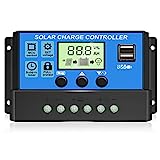
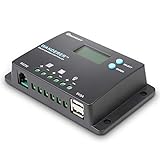

![Best value charge controllers 6 [Upgraded] 30A Solar Charge Controller, 12V/ 24V Solar Panel Regulator with Adjustable LCD Display Dual USB Port Timer Setting PWM Auto Parameter](https://m.media-amazon.com/images/I/41opvkWthjL._SL160_.jpg)


